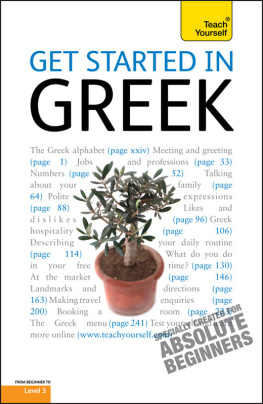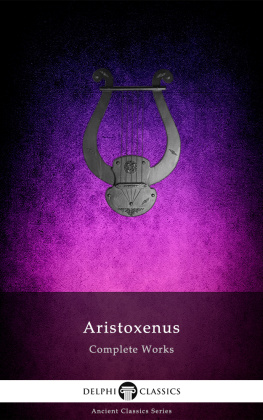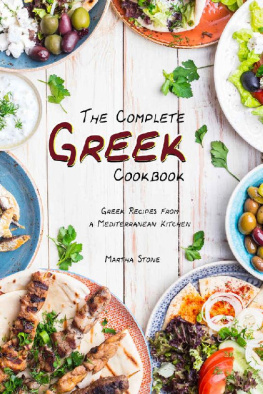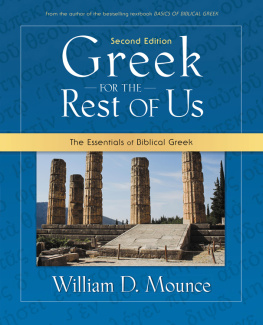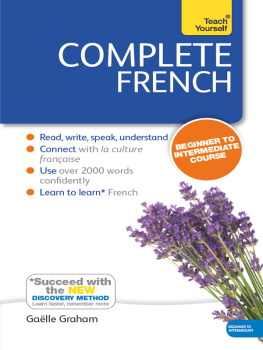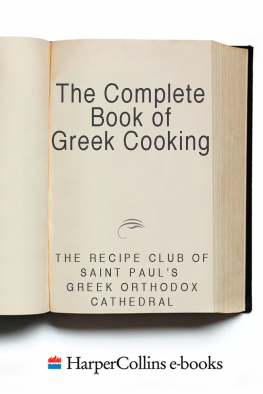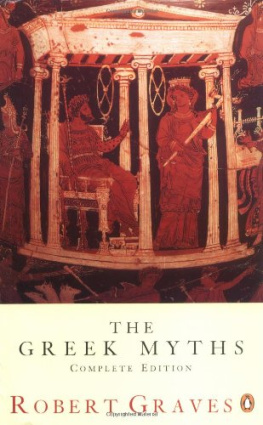Matsukas - Complete Greek: Teach Yourself
Here you can read online Matsukas - Complete Greek: Teach Yourself full text of the book (entire story) in english for free. Download pdf and epub, get meaning, cover and reviews about this ebook. year: 2012, publisher: John Murray Press, genre: Children. Description of the work, (preface) as well as reviews are available. Best literature library LitArk.com created for fans of good reading and offers a wide selection of genres:
Romance novel
Science fiction
Adventure
Detective
Science
History
Home and family
Prose
Art
Politics
Computer
Non-fiction
Religion
Business
Children
Humor
Choose a favorite category and find really read worthwhile books. Enjoy immersion in the world of imagination, feel the emotions of the characters or learn something new for yourself, make an fascinating discovery.
- Book:Complete Greek: Teach Yourself
- Author:
- Publisher:John Murray Press
- Genre:
- Year:2012
- Rating:3 / 5
- Favourites:Add to favourites
- Your mark:
- 60
- 1
- 2
- 3
- 4
- 5
Complete Greek: Teach Yourself: summary, description and annotation
We offer to read an annotation, description, summary or preface (depends on what the author of the book "Complete Greek: Teach Yourself" wrote himself). If you haven't found the necessary information about the book — write in the comments, we will try to find it.
Complete Greek: Teach Yourself — read online for free the complete book (whole text) full work
Below is the text of the book, divided by pages. System saving the place of the last page read, allows you to conveniently read the book "Complete Greek: Teach Yourself" online for free, without having to search again every time where you left off. Put a bookmark, and you can go to the page where you finished reading at any time.
Font size:
Interval:
Bookmark:
Teach
Yourself
Aristarhos Matsukas

Special thanks for this new edition go to Rebecca Green, Ginny Catmur and Sue Hart, my editors at Hodder Education, also to my students in New York City, Athens, and now in Berlin who have shown me over the years what is important and fun when learning Modern Greek.


I have worked as a professional author and language teacher for over 25 years. I have written language books with special focus on Greek as a foreign language, including a bilingual EnglishGreek, GreekEnglish pocket dictionary. I have lived about half of my life away from Athens, my birthplace, first in the US for fourteen years, where I had studied Teaching English as a Foreign Language (TEFL) and Applied Linguistics, and now in Berlin for the last nine years.
My accumulated teaching experience of Modern Greek comes from teaching adults and college students in New York City, then Athens, and more recently Berlin. My professional experience also includes among others university teaching in the USA, working as a head of department in a community college in Athens, as a language school director in Ioannina (Greece), and as the translator of three cookery books.
When not at my desk, I can usually be found in the kitchen, in a bookshop, or at a language book fair. I love travelling (having visited more than twenty countries), watching TV, and learning languages.
Aristarhos Matsukas

According to Aristides Konstantinides book Greek Words in the English Language there are 45,729 Greek words in English!
As you work through this course, you will become increasingly aware of Greek loanwords in English although sometimes, you have to stretch your imagination and bend the odd pronunciation rule to spot them. Here are some first examples of loan words: problem, music, politics, idea, programme, system. Have a go at the similar or different exercises in the Practice section of each unit. There are at least ten words in these exercises throughout this book that test your ability to make associations between what you already know and what you are learning. These associations can sometimes be difficult to detect: for example the words (myth), (metre) and (period) are easily detected once you know the Greek alphabet, but the word (book) does not carry an immediate association, although bibliography does.
You might be relieved to know that there are a large number of English loanwords in Greek too, for example complex, stress and camping. Many sports are also identical in both languages, for instance tennis and volleyball. New technology has also introduced many terms in Greek: computer, fax, and email are a few examples. In Greece many signs are in English, including the street sign for stop, the sign WC for public toilets, and even P for car parks. Sometimes, there is a Greek word for these words, but the English word is generally used in everyday language.

Greek is one of the Indo-European languages, with more than 4,000 years of development and history. It is spoken by more than 10 million people in Greece alone and about 4 million people elsewhere. Australia, Canada, the USA, and South Africa still have the largest Greek-speaking populations outside Greece. Apart from the second- or third-generation Greeks abroad, many foreigners, like perhaps yourself, learn Greek in colleges, adult education centres, or private language schools every single year. One of the reasons is perhaps to keep up ties with families, or new relatives, or even business colleagues in Greece. No matter what your reason is for actually wanting to learn Greek, you are about to study a very interesting language, rooted in a deep and rich cultural heritage, and spoken by a very proud nation.
After so many centuries, past works in this language are still relevant in many disciplines including philosophy, drama, the arts, and architecture, just to name a few. New doctors still take the Hippocratic Oath before graduation. Theologians and ordinands still read the New Testament in its original language, and mathematicians still try to expand on Pythagorass theorem after 2,500 years! The rich cultural and linguistic past of the Greeks should not be viewed as an extra burden on your efforts to learn Modern Greek as it is nowadays spoken in Greece. On the contrary, that past should make you aware that learning Greek today can set you apart from other bilinguals or multilinguals who claim knowledge of other major languages. It is not only an advantage to be able to speak Greek; it should also be a privilege and a unique experience! Even in the business world, knowledge of less commonly spoken languages can make a difference when you apply for a new job, so take this as a rewarding experience right from the start and remember you are not the first person to try and learn Greek. Many other language learners have succeeded in the past with this beautiful language and now you will be the next one.
Apart from this course, you can nowadays get so much information through the Internet, from Greek music to online dictionaries or photos from all over Greece or even the new Acropolis Museum in Athens! The Internet can accompany your efforts with this book and can add colour, shapes, and designs as well as enrich the suggestions or topics we are dealing with in this book.
Do not also forget what we pointed out to you in the one-minute-summary. You already know more than you probably think! Throughout the units we try to reinforce and single out certain obvious or not so obvious similarities in both languages. People are often surprised to realize that so many words are almost similar and/ or easy to remember. Let us give you some examples here with Greek numbers: triathlon from tria, for three; pentagon from pente, for five; octagon from okto, for eight; or even decimal or decathlon from THeka for ten. What is also very comforting is that many road signs, or signs in airports, railway stations, or harbours are usually bilingual in Greek and English! This book will, however, prepare you also for some signs you might encounter only in Greek. So the combination of bilingual signs in Greece and familiarity with the Greek script as taught in this book should prevent you from becoming afraid of this new alphabet. Remember also that we will use a lot of transliteration to boost your confidence with many initial vocabulary items that can be tackled this way and so relieve you of an extra burden. So kalimera, kalispera and kalinihta will be greetings and valedictions for you to understand and/or use immediately, rather than having to spend five minutes thinking about their spelling! After all this information, are you ready now to move on and make some progress with grammar?
Next pageFont size:
Interval:
Bookmark:
Similar books «Complete Greek: Teach Yourself»
Look at similar books to Complete Greek: Teach Yourself. We have selected literature similar in name and meaning in the hope of providing readers with more options to find new, interesting, not yet read works.
Discussion, reviews of the book Complete Greek: Teach Yourself and just readers' own opinions. Leave your comments, write what you think about the work, its meaning or the main characters. Specify what exactly you liked and what you didn't like, and why you think so.


